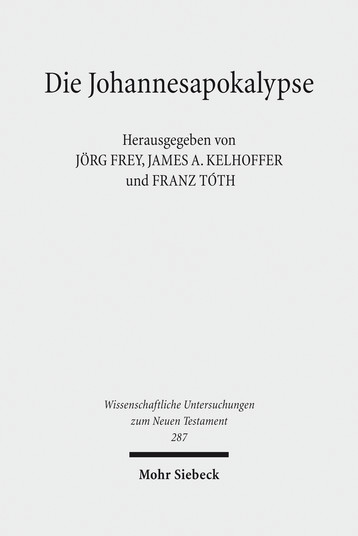Theology
Die Johannesapokalypse
Kontexte – Konzepte – Wirkungen
Hrsg. v. Jörg Frey, James A. Kelhoffer u. Franz Tóth
[The Revelation of John. Contexts – Concepts – Impacts]
204,00 €
including VAT
including VAT
cloth
ISBN 978-3-16-150603-1
available
Also Available As:
Published in German.
The Revelation of John receives much attention in New Testament scholarship. This volume offers an extensive discussion of Revelation's historical location and date, its history-of-religions background and reception of early Christian tradition, as well as its rhetoric and theological aims and concepts. The volume contains papers from a Symposium held in Munich and additional invited contributions, which survey some of the most important current debates. The first part -»contexts«- contains essays on the text and the traditions adopted, the historical context and date of Revelation. The second part -»concepts«- focuses on theological themes, from Christology to eschatology and martyrdom. A third part on -»effects«- contains essays on several important forms of the reception of Revelation, from Montanism and Lactantius down to Orthodox liturgy and the art of William Blake.Survey of contents
Franz Tóth: Erträge und Tendenzen der gegenwärtigen Forschung zur JohannesapokalypseI. Kontexte
Martin Karrer: Der Text der Johannesapokalypse – Thomas Witulski: Der römische Kaiser Hadrian und die neutestamentliche Johannesapokalypse – Stefan Witetschek: Ein weit geöffnetes Zeitfenster? Überlegungen zur Datierung der Johannesapokalypse – Michael Labahn: Die Septuaginta und die Johannesapokalypse: Möglichkeiten und Grenzen einer Verhältnisbestimmung im Spiegel von kreativer Intertextualität und Textentwicklungen – Loren T. Stuckenbruck / Mark D. Mathews: The Apocalypse of John, 1 Enoch, and the Question of Influence – Enno Edzard Popkes: Vollendete Gottesgegenwart: Anmerkungen zu den traditionsgeschichtlichen Bezugsgrößen von Apk 21,1–5 – Clare K. Rothschild: Principle, Power, and Purgation in the Letter to the Church in Laodicea (Rev 3:14–22) – Jan Dochhorn: Beliar als Endtyrann in der Ascensio Isaiae. Ein Beitrag zur Eschatologie und Satanologie des frühen Christentums sowie zur Erforschung der Apokalypse des Johannes
II. Konzepte
Franz Tóth: Von der Vision zur Redaktion. Untersuchungen zur Komposition, Redaktion und Intention der Johannesapokalypse – Hans-Georg Gradl: Buch und Brief. Zur motivischen, literarischen und kommunikativen Interdependenz zweier medialer Typen in der Johannes-Offenbarung – Konrad Huber: Jesus Christus – der Erste und der Letzte. Zur Christologie der Johannesapokalypse – Jörg Frey: Was erwartet die Johannesapokalypse? Zur Eschatologie des letzten Buchs der Bibel – James A. Kelhoffer: The Relevance of Revelation's Date and the Imperial Cult for John's Appraisal of the Value of Christians' Suffering in Revelation 1–3 – Jan Willem van Henten: The Concept of Martyrdom in Revelation – Roland Bergmeier: Zeugnis und Martyrium
III. Rezeption
William Tabbernee: The Appearance of the New Jerusalem in Montanist Interpretation and the Revelation of John – Tobias Nicklas: Die apokryphe Thomasapokalypse und ihre Rezeption der Offenbarung desJohannes – Valentin Fàbrega: Laktanz und die Apokalypse – Juan Hernández, Jr.: Andrew of Caesarea and His Reading of Revelation. Catechesis and Paranesis – Konstantin Nikolakopoulos: Die Apokalypse des Johannes und die orthodoxe Liturgie. Anknüpfungspunkte zwischen Apokalypse und orthodoxem Kultus – Christopher Rowland: 'Mr. Blake: apo- or rather ana-calyptic Poet and Painter': Apocalyptic Hermeneutics in Action
